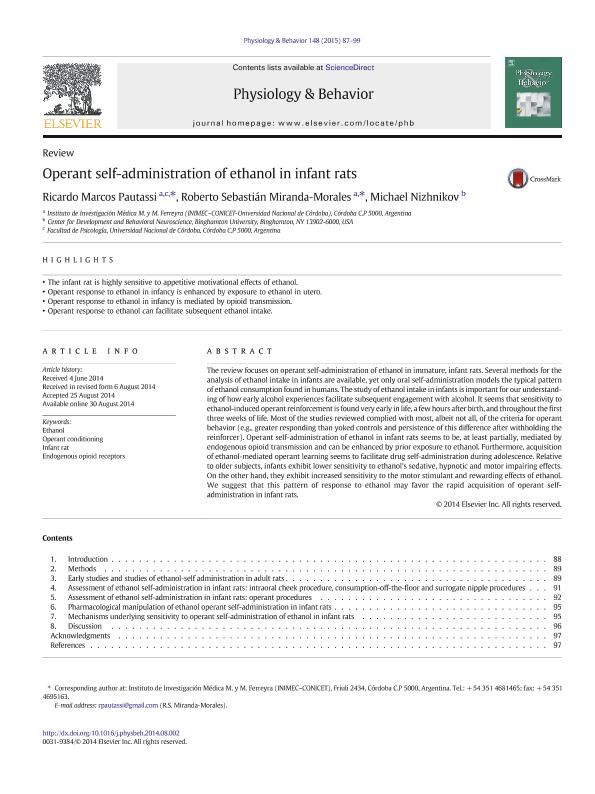Artículo
Operant self-administration of ethanol in infant rats
Fecha de publicación:
01/09/2015
Editorial:
Pergamon-Elsevier Science Ltd
Revista:
Physiology And Behavior
ISSN:
0031-9384
e-ISSN:
1873-507X
Idioma:
Inglés
Tipo de recurso:
Artículo publicado
Clasificación temática:
Resumen
The review focuses on operant self-administration of ethanol in immature, infant rats. Several methods for the analysis of ethanol intake in infants are available, yet only oral self-administration models the typical pattern of ethanol consumption found in humans. The study of ethanol intake in infants is important for our understanding of how early alcohol experiences facilitate subsequent engagement with alcohol. It seems that sensitivity to ethanol-induced operant reinforcement is found very early in life, a few hours after birth, and throughout the first three weeks of life. Most of the studies reviewed complied with most, albeit not all, of the criteria for operant behavior (e.g., greater responding than yoked controls and persistence of this difference after withholding the reinforcer). Operant self-administration of ethanol in infant rats seems to be, at least partially, mediated by endogenous opioid transmission and can be enhanced by prior exposure to ethanol. Furthermore, acquisition of ethanol-mediated operant learning seems to facilitate drug self-administration during adolescence. Relative to older subjects, infants exhibit lower sensitivity to ethanol's sedative, hypnotic and motor impairing effects. On the other hand, they exhibit increased sensitivity to the motor stimulant and rewarding effects of ethanol. We suggest that this pattern of response to ethanol may favor the rapid acquisition of operant self-administration in infant rats.
Palabras clave:
ENDOGENOUS OPIOID RECEPTORS
,
ETHANOL
,
INFANT RAT
,
OPERANT CONDITIONING
Archivos asociados
Licencia
Identificadores
Colecciones
Articulos(INIMEC - CONICET)
Articulos de INSTITUTO DE INV. MEDICAS MERCEDES Y MARTIN FERREYRA
Articulos de INSTITUTO DE INV. MEDICAS MERCEDES Y MARTIN FERREYRA
Citación
Pautassi, Ricardo Marcos; Miranda Morales, Roberto Sebastián; Nizhnikov, Michael; Operant self-administration of ethanol in infant rats; Pergamon-Elsevier Science Ltd; Physiology And Behavior; 148; 1-9-2015; 87-99
Compartir
Altmétricas




